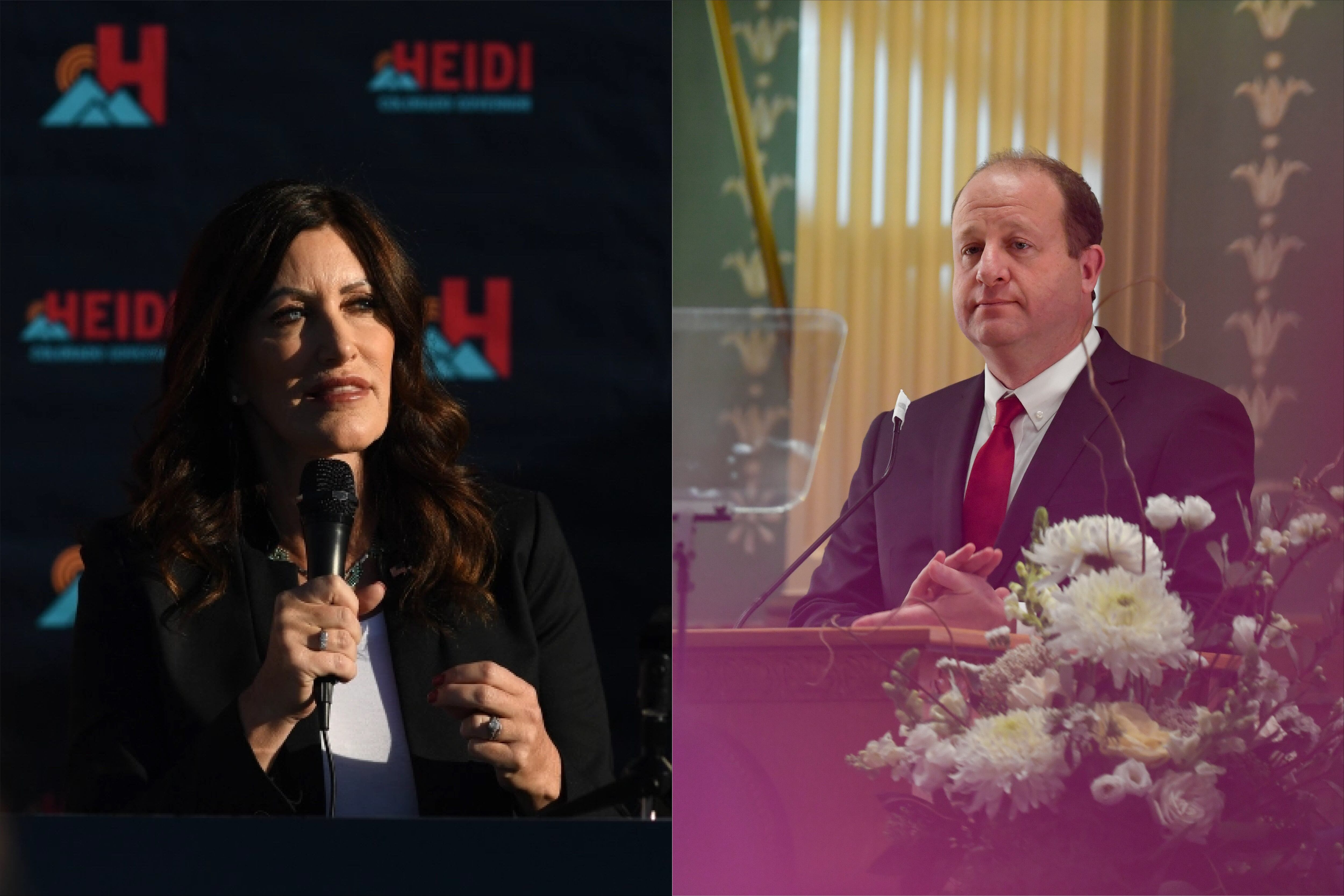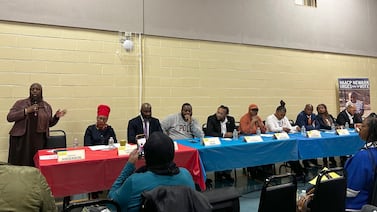Listen to Colorado Gov. Jared Polis, and you’ll hear about great things happening in education. Districts are getting thousands more dollars per student, teachers are getting raises, and a preschool program set to launch next fall will set Colorado’s youngest students on the path to success while saving families money.
Listen to Heidi Ganahl, and she’ll paint a far grimmer picture. More than 60% of Colorado students can’t read, write, or do math at grade level, based on state test scores. Schools are teaching “nonsense” rather than focusing on the basics, and students are suffering unprecedented mental health problems as a consequence of pandemic-era school closures for which Polis ultimately bears the blame.
Republican Ganahl, an entrepreneur and University of Colorado regent, has cast herself as a “Mom on a Mission” in her bid to unseat Democratic incumbent Polis, who made education policy central to his first term.
National polls find voters trust Democrats less on education than they used to. And Republicans such as Virginia Gov. Glenn Youngkin have ridden parent dissatisfaction into office. Ganahl has used a similar playbook by decrying “woke ideologies” and telling her own story about her children’s elementary school hosting a play about a transgender raven.
Still, the economy and public safety have dominated the campaign far more than education: Just 5.5% of Colorado voters ranked education as a top concern in a recent Fox 31/Emerson College/The Hill poll.
Against that backdrop, Polis — who holds a commanding lead in the polls — has argued for building on foundations laid in his first term. He’s pledged to increase school funding, expand efforts to connect education and careers, and do more to turn around low-performing schools.
“My opponent’s a mad mom,” he said at the conclusion of a debate Tuesday. “I’m a happy dad. I know there are a lot of happy moms and dads out there that recognize Colorado is doing amazing work.”
Meanwhile, Ganahl calls for more “choice, competition, and transparency.” She’s promised to improve school safety, address mental health, get every child reading at grade level by third grade, and “give power back to parents.”
“I’m offering a brighter future with big bold ideas,” she said.
COVID challenges shape first term
A little more than a year into Polis’ first term, COVID arrived in Colorado, and schools shut down, a life-altering event that would dominate the next two years. Starting in the summer of 2020, Polis urged a return to in-person learning, even as health department guidance made the logistics challenging.
During the 2020-21 school year, many superintendents said state public health rules made it nearly impossible for schools to stay open when COVID case rates skyrocketed, while Polis insisted schools were safe.
Ganahl would not say whether she would have ordered schools to stay open. Instead, she said she would have listened to parents who said the isolation of remote learning hurt their children.
“A lot of the dirty work that Jared Polis does is through his bureaucrats, his unelected bureaucrats, his agency heads so that he doesn’t have to take the heat,” Ganahl said.
Polis emphasized that many decisions about in-person learning were left to local communities. But he pointed to state responses like sending free medical grade masks and COVID tests to school districts, relaxing quarantine requirements, and prioritizing teachers for vaccines in 2021.
“Whatever it took for in-person education to occur, we wanted to work with districts to do that,” Polis said.
Ganahl pushes giving money to parents
In order to give parents and students more choice, Ganahl wants to create educational savings accounts that would allow parents to use money that otherwise would have gone to the school district for other educational purposes. The details would depend on who controls the legislature or whether she puts a ballot measure to voters, but Ganahl suggested parents might get access to the full state portion of per-pupil spending, roughly $5,500 a year.
Ganahl said she had to move two of her children, one with dyslexia and another with dysgraphia, to a private school with small class sizes when they didn’t get the help they needed in public school. “I want every parent to have that choice,” she said.
But Democrats, who currently control the state legislature, have opposed giving public money directly to parents. A Magellan Strategies poll this spring found Colorado voters disapproved of this idea by wide margins.
Polis said parents already can enroll in charter schools or in another school district under Colorado’s open enrollment system, and schools are offering tutoring using federal money.
‘Nonsense’ and curriculum oversight
Low academic performance isn’t the only reason parents need options, Ganahl said. She said Colorado parents tell her about things “that they don’t feel are good for our kids or that they feel are distracting from reading, writing, and math.” They should be able to send their children to schools that match their values, she said.
She also said parents need more insight into curriculum, programming choices, and teacher training. To that end, Ganahl said she would revive a curriculum transparency proposal that died last year in a Democratic-controlled committee.
“It doesn’t mean that parents need to control the curriculum or say you can’t teach this or that,” she said. “But they do need to be kept up to date.”
In an interview with Chalkbeat, Ganahl declined to give examples of what she frequently describes as “nonsense” in schools. But her campaign staff later shared an open letter from Cherry Creek parents that complained about everything from phasing out the valedictorian honor to a lesson in which students allegedly were prompted to write about why their favorite hobbies were racist. A district spokeswoman said administrators could find no evidence the lesson ever happened.
On a website run by Steve Bannon, a one-time chief strategist for President Donald Trump, Ganahl described being shocked and outraged that her children watched a play about a transgender raven when they were in first grade. She wrote that the experience taught her what it is like “to have your kids be taught inappropriate things without having a say.”
The Boulder Valley school told Colorado Public Radio the goal of hosting the play was to address the bullying of a transgender student. Nonbinary and transgender youth have high rates of suicide, and Colorado’s Healthy Kids survey finds a majority of LGBTQ youth don’t feel welcome at school.
In September, Ganahl drew widespread attention after telling a conservative radio host that schools were tolerating students identifying as cats, and that it was a major distraction for other students.
Claims that students are disrupting schools by identifying as cats — and even that schools are providing them with litter boxes, something Ganahl has not said — have popped up in dozens of states, often alongside anti-transgender rhetoric. These claims have been debunked repeatedly.
Colorado school administrators have said the real problem comes not from the fact that a small number of students participate in a niche subculture and wear accessories like cat ear headbands or tails, but that schools must now repeatedly address misguided outrage and false rumors fueled by claims like Ganahl’s.
Polis seized on Ganahl’s claims to paint her as unserious. He also said it’s not the role of the governor to weigh in on school district dress codes and student behavior. Those are community decisions.
Can Ganahl’s tax plan support schools?
Polis’ critique of Ganahl’s education plans starts with her tax proposal.
She’s pledged to eliminate Colorado’s income tax over eight years. Income tax accounts for roughly $9 billion of the state’s $12.5 billion general fund, and 32% of the general fund goes to K-12 education. Colorado already funds its schools below the national average and below constitutional requirements approved by voters 20 years ago.
But without income tax revenue, Polis said, the state would be forced to cut spending, and school districts would have to cut teacher pay and increase class sizes.
“That’s the last thing our schools need right now,” Polis said. “We need to invest in our schools.”
Polis also has expressed interest in ending the state income tax, although unlike Ganahl, he hasn’t put forward a specific plan to do so. He suggested new taxes on pollution could offset lost revenue without cutting state government.
Ganahl said her plan would bring in more revenue by attracting new businesses, and state spending cuts won’t affect education. Ganahl added that school districts should cut administrative positions to increase funding for classrooms and teacher salaries.
Ganahl’s plan calls for freezing state hiring, cutting the budget 10% annually during her first term, eliminating tax loopholes, and asking voters to convert service fees to taxes that could go into the general fund.
States with no income tax generally have higher sales, property, and other taxes. An analysis by Colorado’s conservative Independence Institute called Ganahl’s plan “ambitious” but said it could work with the right cuts to government services.
Polis sees preschool as key
Polis campaigned in 2018 on making full-day kindergarten free to families, who previously had to pay tuition, and creating a universal preschool program. He delivered on full-day kindergarten his first year in office, and this year, signed legislation to launch universal preschool.
Funded by a voter-approved nicotine tax, the preschool program promises to provide at least 10 hours a week for all children in the year before kindergarten. Families won’t have to pay for those hours, essentially creating a discount on full-time preschool.
Polis touts preschool at every opportunity. Ask him about the high cost of living, he talks about the money the program will save parents. Ask him about dismal math scores on standardized tests, he brings up research on improved academic outcomes for children who attend preschool.
“Early childhood education is one of the most important determinants of how kids succeed, and not just in school,” Polis said. “We’re giving kids a strong start, not just those who can afford it, but everyone should be able to go to preschool.”
Parents won’t actually be able to enroll their children until next fall, and many details are still unknown. Still, many early childhood advocates have lauded the program as a critical step forward.
Ganahl has cast doubt on the Polis administration’s ability to run the program — she’s suggested that “nonsense” might be taught in preschool classrooms as well — and said the limited hours don’t address the needs of working families.
Ganahl serves as a network member of EPIC, an organization helping employers provide child care, and wants to see more private-sector solutions. “Just throwing more money at the problem and 10 hours a week is not going to fix this,” she said. “We need all hands on deck.”
The election is Nov. 8.
Correction: This article has been updated to reflect that Heidi Ganahl is a network member of EPIC. She is not a board member.
Bureau Chief Erica Meltzer covers education policy and politics and oversees Chalkbeat Colorado’s education coverage. Contact Erica at emeltzer@chalkbeat.org.





